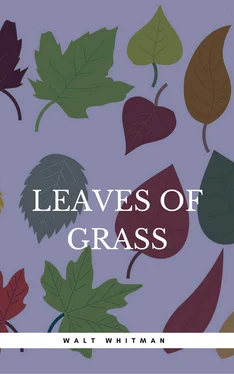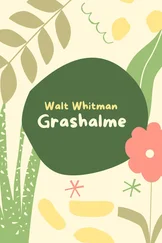Walt Whitman - Leaves of Grass
Здесь есть возможность читать онлайн «Walt Whitman - Leaves of Grass» — ознакомительный отрывок электронной книги совершенно бесплатно, а после прочтения отрывка купить полную версию. В некоторых случаях можно слушать аудио, скачать через торрент в формате fb2 и присутствует краткое содержание. ISBN: , Жанр: Языкознание, Критика, на английском языке. Описание произведения, (предисловие) а так же отзывы посетителей доступны на портале библиотеки ЛибКат.
- Название:Leaves of Grass
- Автор:
- Жанр:
- Год:неизвестен
- ISBN:9782377930524
- Рейтинг книги:4 / 5. Голосов: 1
-
Избранное:Добавить в избранное
- Отзывы:
-
Ваша оценка:
- 80
- 1
- 2
- 3
- 4
- 5
Leaves of Grass: краткое содержание, описание и аннотация
Предлагаем к чтению аннотацию, описание, краткое содержание или предисловие (зависит от того, что написал сам автор книги «Leaves of Grass»). Если вы не нашли необходимую информацию о книге — напишите в комментариях, мы постараемся отыскать её.
Leaves of Grass — читать онлайн ознакомительный отрывок
Ниже представлен текст книги, разбитый по страницам. Система сохранения места последней прочитанной страницы, позволяет с удобством читать онлайн бесплатно книгу «Leaves of Grass», без необходимости каждый раз заново искать на чём Вы остановились. Поставьте закладку, и сможете в любой момент перейти на страницу, на которой закончили чтение.
Интервал:
Закладка:
Muscle and pluck forever!
What invigorates life, invigorates death,
And the dead advance as much as the living advance,
And the future is no more uncertain than the present,
And the roughness of the earth and of man encloses as much as the delicatesse of the earth and of man,
And nothing endures but personal qualities.
What do you think endures?
Do you think the greatest city endures?
Or a teeming manufacturing state? or a prepared constitution? or the best built steam-ships?
Or hotels of granite and iron? or any chef-d’oeuvres of engineering, forts, armaments?
Away! These are not to be cherished for themselves,
They fill their hour, the dancers dance, the musicians play for them,
The show passes, all does well enough of course,
All does very well till one flash of defiance.
The greatest city is that which has the greatest man or woman,
If it be a few ragged huts, it is still the greatest city in the whole world.
The place where the greatest city stands is not the place of stretched wharves, docks, manufactures, deposites of produce,
Nor the place of ceaseless salutes of new-comers, or the anchor-lifters of the departing,
Nor the place of the tallest and costliest buildings, or shops selling goods from the rest of the earth,
Nor the place of the best libraries and schools, nor the place where money is plentiest,
Nor the place of the most numerous population.
Where the city stands with the brawniest breed of orators and bards,
Where the city stands that is beloved by these, and loves them in return, and understands them,
Where these may be seen going every day in the streets, with their arms familiar to the shoulders of their friends,
Where no monuments exist to heroes but in the common words and deeds,
Where thrift is in its place, and prudence is in its place,
Where behavior is the finest of the fine arts,
Where the men and women think lightly of the laws,
Where the slave ceases and the master of slaves ceases,
Where the populace rise at once against the audacity of elected persons,
Where fierce men and women pour forth as the sea to the whistle of death pours its sweeping and unript waves,
Where outside authority enters always after the precedence of inside authority,
Where the citizen is always the head and ideal, and President, Mayor, Governor, and what not, are agents for pay,
Where children are taught from the jump that they are to be laws to themselves, and to depend on themselves,
Where equanimity is illustrated in affairs,
Where speculations on the soul are encouraged,
Where women walk in public processions in the streets the same as the men,
Where they enter the public assembly and take places the same as the men, and are appealed to by the orators the same as the men,
Where the city of the faithfulest friends stands,
Where the city of the cleanliness of the sexes stands,
Where the city of the healthiest fathers stands,
Where the city of the best-bodied mothers stands,
There the greatest city stands.
How beggarly appear poems, arguments, orations, before an electric deed!
How the floridness of the materials of cities shrivels before a man’s or woman’s look!
All waits, or goes by default, till a strong being appears;
A strong being is the proof of the race, and of the ability of the universe,
When he or she appears, materials are over-awed,
The dispute on the soul stops,
The old customs and phrases are confronted, turned back, or laid away.
What is your money-making now? What can it do now?
What is your respectability now?
What are your theology, tuition, society, traditions, statute-books now?
Where are your jibes of being now?
Where are your cavils about the soul now?
Was that your best? Were those your vast and solid?
Riches, opinions, politics, institutions, to part obediently from the path of one man or woman!
The centuries, and all authority, to be trod under the foot-soles of one man or woman!
—A sterile landscape covers the ore—there is as good as the best, for all the forbidding appearance,
There is the mine, there are the miners,
The forge-furnace is there, the melt is accomplished, the hammers-men are at hand with their tongs and hammers,
What always served and always serves, is at hand.
Than this nothing has better served—it has served all,
Served the fluent-tongued and subtle-sensed Greek, and long ere the Greek,
Served in building the buildings that last longer than any,
Served the Hebrew, the Persian, the most ancient Hindostanee,
Served the mound-raiser on the Mississippi, served those whose relics remain in Central America,
Served Albic temples in woods or on plains, with unhewn pillars, and the druids, and the bloody body laid in the hollow of the great stone,
Served the artificial clefts, vast, high, silent, on the snow-covered hills of Scandinavia,
Served those who, time out of mind, made on the granite walls rough sketches of the sun, moon, stars, ships, ocean-waves,
Served the paths of the irruptions of the Goths, served the pastoral tribes and nomads,
Served the incalculably distant Celt, served the hardy pirates of the Baltic,
Served before any of those, the venerable and harmless men of Ethiopia,
Served the making of helms for the galleys of pleasure, and the making of those for war,
Served all great works on land, and all great works on the sea,
For the medieval ages, and before the medieval ages,
Served not the living only, then as now, but served the dead.
I see the European headsman,
He stands masked, clothed in red, with huge legs, and strong naked arms,
And leans on a ponderous axe.
Whom have you slaughtered lately, European headsman?
Whose is that blood upon you, so wet and sticky?
I see the clear sun-sets of the martyrs,
I see from the scaffolds the descending ghosts,
Ghosts of dead princes, uncrowned ladies, impeached ministers, rejected kings,
Rivals, traitors, poisoners, disgraced chieftains, and the rest.
I see those who in any land have died for the good cause,
The seed is spare, nevertheless the crop shall never run out,
Mind you, O foreign kings, O priests, the crop shall never run out.
I see the blood washed entirely away from the axe,
Both blade and helve are clean,
They spirt no more the blood of European nobles,—they clasp no more the necks of queens.
I see the headsman withdraw and become useless,
I see the scaffold untrodden and mouldy, I see no longer any axe upon it,
I see the mighty and friendly emblem of the power of my own race, the newest largest race.
America! I do not vaunt my love for you,
I have what I have.
The axe leaps!
The solid forest gives fluid utterances,
They tumble forth, they rise and form,
Hut, tent, landing, survey,
Flail, plough, pick, crowbar, spade,
Shingle, rail, prop, wainscot, jamb, lath, panel, gable,
Citadel, ceiling, saloon, academy, organ, exhibition-house, library,
Cornice, trellis, pilaster, balcony, window, shutter, turret, porch,
Hoe, rake, pitch-fork, pencil, wagon, staff, saw, jackplane, mallet, wedge, rounce,
Chair, tub, hoop, table, wicket, vane, sash, floor,
Work-box, chest, stringed instrument, boat, frame, and what not,
Capitols of States, and capitol of the nation of States,
Long stately rows in avenues, hospitals for orphans or for the poor or sick,
Manhattan steamboats and clippers, taking the measure of all seas.
Интервал:
Закладка:
Похожие книги на «Leaves of Grass»
Представляем Вашему вниманию похожие книги на «Leaves of Grass» списком для выбора. Мы отобрали схожую по названию и смыслу литературу в надежде предоставить читателям больше вариантов отыскать новые, интересные, ещё непрочитанные произведения.
Обсуждение, отзывы о книге «Leaves of Grass» и просто собственные мнения читателей. Оставьте ваши комментарии, напишите, что Вы думаете о произведении, его смысле или главных героях. Укажите что конкретно понравилось, а что нет, и почему Вы так считаете.












